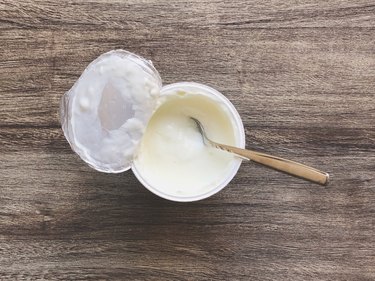
There are lots of sports drinks that claim to help improve health and performance by supplying you with electrolytes. While the promises from these companies make purchasing their goods tempting, you can get your own natural electrolytes from certain foods or easy, homemade electrolyte drinks.
Although not everyone needs to take in extra electrolytes, Cleveland Clinic points out that you may have higher needs during intense exercise, periods of heavy sweating and if you're vomiting or have diarrhea. In these situations, when dehydration is more of a risk, natural electrolytes can help keep your body functioning properly and prevent complications from dehydration.
Video of the Day
Video of the Day
What Are Electrolytes?
Electrolytes are minerals that have an electric charge. The main electrolytes are sodium, potassium, calcium, magnesium, phosphate and chloride. All of these electrolytes work together to carry out a number of roles in your body like:
- Balancing the amount of fluids
- Maintaining pH levels
- Moving nutrients in and waste out of your cells
- Keeping your heart, brain, muscles and nerves functioning properly
Electrolytes are so important that a March 2013 report in the World Journal of Emergency Medicine says that fluid and electrolyte balance is one of the most vital factors in maintaining homeostasis (or balance) in the body. The same report notes that keeping your electrolyte levels balanced is a key component in managing many medical conditions.
Although your kidneys help balance your electrolytes, there are times when you may need to increase your intake — like during intense exercise. There are two major ways to get natural electrolytes: foods that are naturally high in the minerals and by making your own homemade electrolyte drink.
Read more: What are Electrolytes, Anyway?
Food Sources of Electrolytes
Many people can replenish their electrolytes just by including electrolyte-rich foods in their diet. The Rush University Medical Center breaks down the foods and drinks that are high in each specific electrolyte:
- Calcium: Milk, yogurt, fish with bones (like sardines), eggs, fortified breakfast cereals, beans, asparagus, collard greens, dried apricots and figs
- Chloride: Olives, seaweed, tomatoes, lettuce and celery
- Magnesium: Leafy, green vegetables (such as kale, spinach, turnip greens and collard greens), nuts, peanut butter, dried beans and lentils
- Potassium: Coconut water, sweet potato, bananas, plain yogurt, avocado, peas, beans, tomatoes, oranges, melons, raisins and cooked spinach
While adding a variety of these foods and drinks to your diet can help prevent an electrolyte imbalance in people with normal activity levels, you might need a little extra help if you're an endurance athlete or you sweat a lot. In addition to adding electrolyte-rich foods to your diet, you can also make your own electrolyte drink with simple ingredients that you probably already have on hand.
Read more: How to Add Electrolytes to Water
Making Your Own Electrolyte Drink
When you make your own natural electrolyte drink at home, you can control the amount of added sugar that goes into it (and what kind). It's also free of artificial dyes and colors.
To make your own basic electrolyte drink, combine the following ingredients in a glass or Mason jar:
- 2 to 4 tablespoons fresh lime juice or lemon juice
- 1 cup water
- 2 cups coconut water
- 2 tablespoons of maple syrup or raw honey
- 1/4 teaspoon sea salt
Cover your jar and shake or mix well. You can also make a lemon ginger variety by combining:
- 2 tablespoons lemon juice
- 3 cups mineral water
- 1 teaspoon grated ginger
- 1 tablespoon maple syrup or raw honey
- 1/4 teaspoon sea salt
Your body is pretty good at balancing its electrolytes on its own. While there are times when you may need more, Harvard Health Publishing notes that over-hydration is often a bigger problem than dehydration. While increasing your intake of electrolyte-rich foods and making your own natural electrolyte drinks isn't likely to cause any harm, try to stay away from sports drinks that contain artificial colorings, flavors and too much sugar.
- Cleveland Clinic: "Electrolyte Drinks: Beneficial or Not?"
- USDA FoodData Central: "Nuts, Coconut Water (Liquid From Coconuts)
- Harvard Health Publishing: "Trade Sports Drinks for Water"
- Rush University Medical Center: "Body Electric"
- World Journal of Emergency Medicine: "General Characteristics of Patients With Electrolyte Imbalance Admitted to Emergency Department"
- Arizona State University: "Healthy Devils: Electrolyte Drink Recipes for Staying Hydrated"
- U.S. National Library of Medicine: "Fluid and Electrolyte Balance"